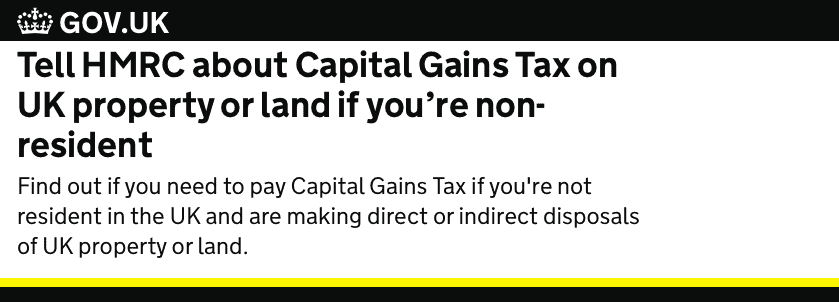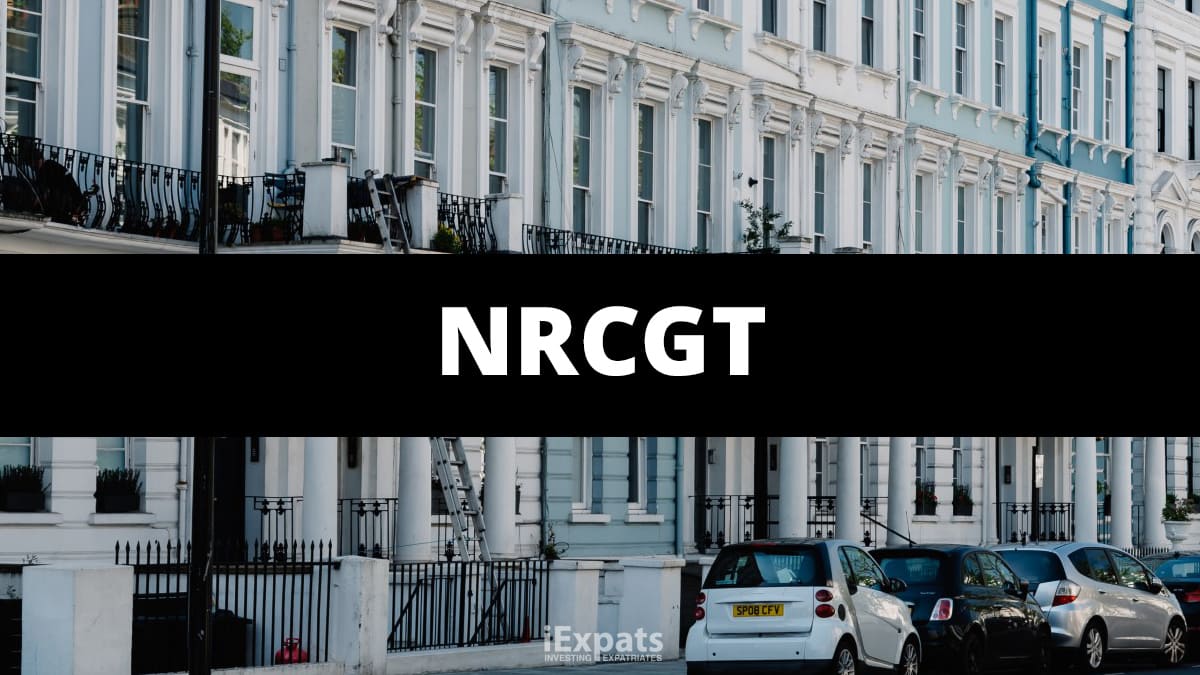Estimated reading time: 10 minutes
Capital Gains Tax (CGT) usually applies to taxpayers who live in the UK, but special rules bring expats and other non-residents into the tax net if they make a profit from selling a home while living overseas.
UK taxpayers must pay CGT when the sell or dispose of an asset anywhere in the world.
For expats, the rules to watch out for apply to ‘non-resident CGT’, often referred to as NRCGT.
If you are an expat who left the country some years ago, you may not have encountered the rules, as they started from 2015.
Basically, they are a measure to discourage foreign property investors from competing with UK first time buyers by charging them an enhanced rate of CGT.
Table of contents
- What is non-resident CGT?
- Who pays NRCGT?
- What is property for NRCGT?
- What is a NRCGT disposal?
- Reporting a disposal
- Working out the tax to pay
- CGT expenses
- CGT reliefs and allowances
- NRCGT tax rates
- Property values for NRCGT
- How couples can save NRCGT
- What if I sell my former home in the UK as a non-resident?
- What about tax where I live?
- What do I do if I make a loss?
- Finding out more about NRCGT
- Related Information
What is non-resident CGT?
Non-residents pay CGT when disposing of land or a home in the UK.
Who pays NRCGT?

The rules are strict and include measures to stop taxpayers from moving abroad temporarily to avoid paying CGT.
You must pay NRCGT if you are:
- A non-UK resident
- Representing a deceased non-resident, like an executor of a will. Find to more here about expat wills
- A non-resident in a business partnership
- A non-resident landlord
- A non-resident trustee
- A UK resident qualifying for split year conditions when the disposal is made during the tax year deemed overseas
For HM Revenue & Customs to consider someone temporarily non-resident they must:
- Live in the UK for four out of the seven tax years before they left the country
- Have a permanent home in another country
- Return to the UK less than five years after their official date of departure from the UK
Not passing each of the three tests makes someone a temporary non-resident.
Temporary non-residents who dispose of assets that they owned in the UK before leaving for abroad are liable to pay the tax they have avoided when they return to the UK.
Non-resident companies disposing of property in the UK should pay Corporation Tax on any gains.
Register a non-resident company for UK Corporation Tax
What is property for NRCGT?

NRCGT applies to land or property in the UK.
Residential property is:
- a building used or suitable for use as a home – typically that means the property has a working kitchen and bathroom
- Homes under construction or adaption as homes
- the garden or grounds of homes, including structures or outbuildings in the garden or grounds
- the right to buy a home ‘off plan’
Non-residential property is:
- Shops, offices, workshops, or warehouses
- Agricultural land
- Forest and woodlands
- Any other building which is not residential property
Mixed use property falls into both categories, like a flat over a shop.
What is a NRCGT disposal?
Disposing of property covers:
- Selling
- Gifting
- Swapping
- Receiving money if the property is destroyed, like compensation from an insurance policy
Report a part disposal in the same way as a full disposal.
Reporting a disposal
Non-residents have 30 days from the date of completing the disposal to file a NRCGT tax return and pay any tax due.
Disposals reported more than 30 days after completion attract a late filing penalty interest on any outstanding tax.
Report a NRCGT disposal online even if the transaction involved no tax or a loss.
To do so, expats need a Government Gateway User ID.
If you do not have an ID, you can create one here
You also need to know:
- Disposed property’s address and postcode
- The property type, like house or flat
- Date you bought the property
- Date you exchanged contracts on disposing of the property
- Date you completed the disposal
- Market value of the property on purchase
- Market value of the property on disposal
- Buying and selling costs, like stamp duty and legal fees
- The costs of making improvements to the property
- Workings for any tax reliefs, allowances, or exemptions you are claiming
Report a NRCGT property disposal
Reporting NRCGT late
If you miss the 30-day NRCGT deadline and paying any tax due, you face late-filing penalties.
HMRC will charge interest on overdue NRCGT as well
| Deadline missed by: | Penalty |
|---|---|
| Up to 6 months | £100 |
| Between 6 and 12 months | £300 or 5% of any tax due, whichever is most |
| More than 12 months | £300 or 5% of any tax due, whichever is most |
| Unpaid on January 31 following disposal tax year | 5% of any tax due |
Need Help with your Finances?
Working out the tax to pay
HMRC offers a NRCGT calculator to expats who have disposed off their entire share in land or property in the UK.
You will have to work out part disposals yourself.
Go to the HMRC NRCGT calculator
CGT expenses
CGT rules limit the expenses to claim on a disposal:
- The open market value of the land or home.
- These cover professional fees going in, like a surveyor, estate agent or auctioneer; stamp duty; and legal fees.
- The scope does not include repairs and maintenance but adding to a property. Fitting a new kitchen of the same quality is not an improvement but extending the house to make the kitchen bigger is. Think adding a garage, extension, or loft room.
- Not relating to purchase or disposal but paying for legal action while you own the property, like the cost of taking a neighbour to court over a boundary dispute.
- These cover professional fees on disposal, like estate agent or auction bills and the associated legal costs.
- The open market value of the property on the completion date
CGT reliefs and allowances
Several reliefs and allowances can reduce the amount of NRCGT to pay:
- Everyone has an AEA allowance which works in the same way as the personal allowance for income tax.
For the 2020-21 tax year, the AEA is £12,300 for each taxpayer. If a husband and wide jointly own a buy to let home and sell the property, they both get the AEA to offset against any gain.
- If the property disposal was your former home, you can offset PPR against the gain for the time you lived there. The relief exempts you from CGT on any gain in value of the property while it was your main home.
- The rules changed on April 6, 2020. Property owners can only claim lettings relief from that date if they were live-in landlords sharing a home with tenants.
NRCGT tax rates
If your gain takes you into higher or additional rate tax bands, the NRCGT rate is 28%.
The higher rate threshold would be a personal gain of more than £50,000.
Gains of less than £50,000 are charged at a rate of 18%.
Property values for NRCGT
Expats can slash money of their NRCGT bills thanks to ‘rebasing’ the value of land and property in the UK for tax purposes on April 5, 2015.
Rebasing means resetting of the purchase price of properties acquired before that date to the open market value on April 5, 2015.
The gain or loss becomes the difference between the rebased value less any improvement costs, disposal costs and the disposal price. Expats cannot claim purchase costs.
Any property bought on or after April 5, 2015 has the price set at the open market value on the date purchase completed, with purchase costs included in the NRCGT calculation.
HMRC gives a worked example of how rebasing works:
- date of acquisition – 5 January 2011
- acquisition costs – £500,000
- date of disposal – 6 June 2016
| Disposal proceeds: | £1,250,000 | |
| Incidental disposal costs: | £30,000 | |
| Net disposal proceeds: | £1,220,000 | |
| Market value at April 5, 2015: | £1,000,000 | |
| Improvement costs: | £0 | |
| Total cost: | £1,000,000 | |
| Gain from April 5, 2015 to disposal: | £220,000 |
Read more about rebasing property values
How couples can save NRCGT

If you are an expat married to a spouse or civil partner, you can gain from a simple and effective tax hack that could save you thousands of pounds in NRCGT.
CGT rules consider changing shares of ownership between married couples as exempt from tax.
That allows an expat who owns a £250,000 buy to let them gift their partner a share in the property without paying NRCGT. Then, sell the property with both partners claiming the allowable reliefs, allowances, and expenses to reduce their tax bills.
If the partner already owns a share, but one of you pays NRCGT at the basic rate and the other at a higher rate, the hack allows you to adjust the shareholdings to pay as much basic rate NRCGT as you can.
NRCGT for single owner
| Gain from April 5, 2015 to disposal: | £220,000 | |
| Less AEA | £12,300 | |
| £207,700 | ||
| NRCGT @ 18% | £0 | |
| NRCGT @ 28% | £58,156 |
NRCGT for joint owners
| Gain for each spouse: | £110,000 | £110,000 |
| Less AEA | £12,300 | £12,300 |
| Gain from April 5, 2015 to disposal: | £97,700 | £97,700 |
| NRCGT @ 18% | £0 | £0 |
| NRCGT @ 28% | £27,356 | £27,356 |
| TOTAL CGT: | £54,712 |
The NRCGT saving for joint owners is £3,444 after switching ownership shares.
How does the NRCGT hack work?
Rather than tax charged as an individual or 50:50, filing a Form 17 with HMRC confirms a shareholding change to anything between 99% and 1%.
To gain the most benefit, one owner should pay basic rate tax and the other higher rate tax.
To lodge the change with HMRC, download and complete Form 17 and file along with a declaration sworn in front of a solicitor. This generally costs less than £100 and any solicitor can complete the job, so shop around for the best price.
Once served, the Form 17 stays in force from the date of signing until the filing of another Form 17 changes the share of ownership again or the date a couple stop living together.
The completed form and declaration must arrive with HMRC within 60 days of the date the declaration. If the form misses the deadline, the couple must swear and file a new declaration.
File the Form 17 before the disposal completes for the tax hack to work. Like all things tax, you cannot undo the transaction retrospectively.
What if I sell my former home in the UK as a non-resident?

Selling a former home in the UK is a complicated tax issue for a non-resident.
Expats need to think about NRCGT temporary residence rules, NRCGT and private residence relief (PRR).
What about tax where I live?
Many countries have a tax like the UK’s CGT, which means you may pay tax in the UK and where you live on the same disposal of a property.
Britain has many double taxation treaties with other countries designed to make sure no one pays more tax than they should to either tax authority.
Many expats that retire to Spain sell their Uk property to purchase their home in the sun. Making sure you only pay the tax that is required is important and professional tax planning advice should be taken.
If taxed twice, take professional advice in the country where you live and look at HMRC double taxation guidance online.
What do I do if I make a loss?
Still file a NRCGT return, but you have up to 70 months to file the claim from the end of the tax year when the loss arose.
You can offset the loss against future capital gains to reduce the amount of tax you pay.
Finding out more about NRCGT
HMRC has some online guidance for expats.
CGT for temporary non-residents
Detailed guidance for non-residents working out CGT
Related Information
Below is a list of related articles you may find of interest.

Dear Lisa
Though HMRC’s guideline clearly states that non-residents have to report UK property disposal within 30 days using on-line “Capital gains tax on UK property account” through gateway account, but in the past three weeks, I have tried a number of times to search this service within my company’s on-line gateway account but they only cater for property disposals by trust and estate, but not other organizations such as limited companies. Also there is no paper form reporting after April 6, 2020. As my Hong Kong company will have a property disposal later this month, how can I report this future disposal in my company’s on-line account ? How can my company do the required disposal reporting on-line within 30 days if the reporting system does not exist ? I have also tried to ask by phone and email but either no HMRC staff is available or they refer me back to the HMRC guidelines !!!
I have lived in Australia for 25 years. I have inherited a third share in my mothers house (my former home) in the uk. Do I pay CGT in uk and Australia? I am in a de facto relationship here. What advice? I am retired aged 68.
Dave
Thank you for your message. I would recommend that you head on over to this link and fill out the form to get some advice from our experts. Thank you https://www.iexpats.com/get-advice/